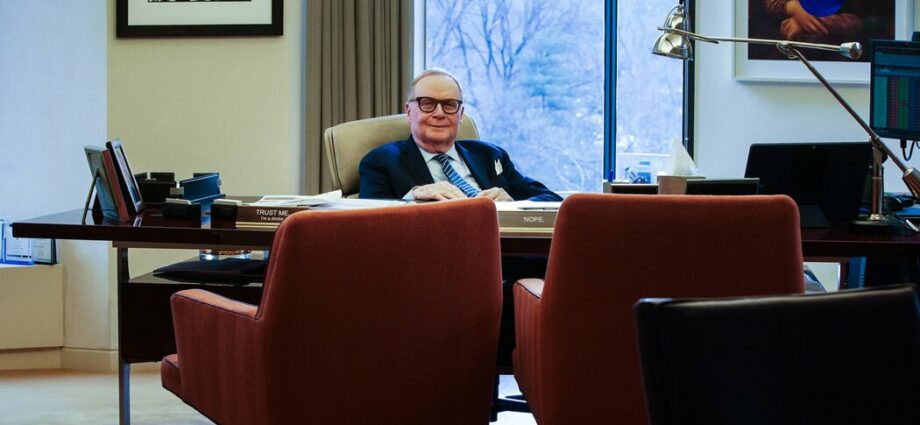Before the era of swashbuckling corporate raiders rained riches and fear on Wall Street, there was Thomas H. Lee.
A private equity titan earlier than practically anyone else, Mr. Lee, through his firm, Thomas H. Lee Partners, cemented Boston as a hub of financiers who took over companies, slashed costs and resold them quickly for profit. Acquisitions of companies like Snapple, Houghton Mifflin and a slew of lesser-known names made him a billionaire before a string of high-profile misfires forced him from his firm.
Mr. Lee died on Thursday in New York City at age 78. The city medical examiner said on Friday that the cause was suicide with a firearm. A spokesman for Mr. Lee’s family provided no other details.
Even among competitors in the strong-shouldered private equity world, Mr. Lee retained a reputation for congeniality.
“I was always impressed by his optimism and people-oriented approach,” said Steve Pagliuca, co-founder of a rival private equity firm, Bain Capital. “He was a kinder, gentler private-equity person.”
Mr. Lee, known as Tommy to friends, was born into great wealth, which he parlayed into even greater wealth. His grandfather Robert W. Schiff, an immigrant from Russian Lithuania, founded the Shoe Corporation of America, which was once credited with selling 15 percent of all shoes in the nation.
While his father joined the family business, Mr. Lee set out on his own. Armed with $150,000 from an inheritance, a loan from his brother and a private education that included a degree from Harvard, he started his own business in 1974 in the nascent world of leveraged buyouts.
This wasn’t the ordinary work of buying up stocks or bonds. Buyout firms raised money from investors, pledged the funds for loans and then used the borrowed money to take over companies. The goal was to find quick cost savings in the businesses, often through layoffs or other corporate restructuring, and then flip them for profit, which Mr. Lee often did with spectacular success.
If a side effect was that the companies often floundered later under the debt that Mr. Lee and his colleagues loaded on them, the investors were long gone by the time of those reckonings.
While competitors focused on the biggest targets possible, Mr. Lee chalked up victories with midsize targets. He organized acquisitions of companies like the GNC vitamin store chain and the lingerie maker Playtex. In perhaps his best known coup, his firm bought Snapple for $135 million in 1992 and sold it just two years later to Quaker Oats for $1.7 billion, a more than 30 times gain.
Just $28 million of the Snapple investment came from Thomas H. Lee Partners’ own coffers.
It wasn’t only the raw numbers that set Mr. Lee apart. The most well known buyout mavens relished their role as so-called raiders who could leave some of the biggest companies in corporate America quaking. Famous names of the era like Michael Milken, who was later jailed on securities charges, and Henry Kravis made for colorful, intimidating characters in books like “Den of Thieves” and “Barbarians at the Gate.”
Mr. Lee went in another direction. His vice was cigar smoking and his hobby was golf — hardly memorable trademarks among financiers. The headline with a 1993 profile of him in The New York Times summed up a common view of him: “In Takeover Games, Nice Guys Don’t Always Finish Last.” The article described Mr. Lee as having “the air both of a tireless salesman not always forthcoming and of a professor fond of explaining complex issues.”
“I’m a friendly guy. I’ve never been poor, and I don’t feel I have to prove myself,” he said in an interview for that article.
But in the latter years of his career, Mr. Lee stumbled. His firm completely wrote off its investment in the fallen commodities broker Refco after its chief executive was discovered to have hidden huge amounts of debt — an embarrassing setback that cost investors hundreds of millions of dollars. Mr. Lee left Thomas H. Lee Partners in 2006 amid reported disagreements with its executives, and the company changed its name to THL Partners.
He briefly started his own hedge funds before closing them amid steep losses a few years later.
He is survived by his wife, Ann Tenenbaum; five children, Jesse, Nathan, Rosalie, Zach and Robert; and two grandchildren.
In his later years, as an avid donor to New York cultural causes, Mr. Lee retained his wit. While accepting an award in 2014 for donations to the UJA-Federation of New York, he earned roars of laughter from the crowd at the St. Regis Hotel in Manhattan in telling a tongue-in-cheek story of “the first buyout,” involving a company owner and his acquisitive new son-in-law.
“It happened at a great event like this,” Mr. Lee said. “A great man was being honored.”
If you are having thoughts of suicide, call or text 988 to reach the National Suicide Prevention Lifeline, or go to SpeakingOfSuicide.com/resources for a list of additional resources.
Hurubie Meko contributed reporting.
Source: Read Full Article

